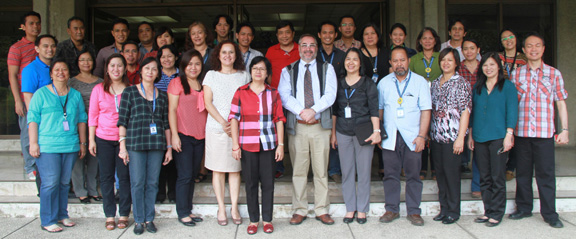
Aiming to improve the skills of our scientists and professionals in crafting well-formulated and well-written proposals for both national and international projects, the Philippine Nuclear Research Institute – Department of Science and Technology (PNRI–DOST) in cooperation with the International Atomic Energy Agency (IAEA) hosted a National Workshop on the Logical Framework Approach for TC Project Design from July 8 to 11 at the PNRI Compound in Quezon City.
Project leaders and other participants from PNRI, National Power Corporation (NPC), Jose Reyes Memorial Medical Center (JRMMC), Philippine Society for Nuclear Medicine (PSNM), Philippine Council for Health Research and Development (PCHRD–DOST), Bureau of Soils and Water Management–Department of Agriculture (BSWBM-DA), Philippine Atmospheric Geophysical and Astronomical Services Administration (PAGASA–DOST) and the Environmental Management Bureau – Department of Environment and Natural Resources (EMB–DENR) were divided into teams as they engaged in step-by-step activities in building a solid framework as a basis for their respective projects.
Experts from the IAEA handled the four-day workshop, emphasizing the benefits of the logical framework approach as part of the agency’s quality management system, particularly as a foundation for a successful technical cooperation project.
“In order to ensure quality and meet the following criteria – relevance, ownership, sustainability, efficiency, effectiveness and safety – the methodology that will help us is the logical framework approach,” said IAEA Training Officer Galya Dimitrova.
The framework involves a thorough analysis of the various aspects of the project, from the problem and situation analyses to the project’s objectives and the issues that various stakeholders would like to be addressed.
“For example, before I can start a radiotherapy treatment in a country, I need to see what kind of existing equipment is already there, what kind of expertise do I already have, what additional expertise will I need, who do I need to train, what do I need to build, what equipment to buy, et cetera,” said IAEA Training Officer Francis Xavier Campbell during his discussion on situation analysis.
Since the Philippines became a Member State of the IAEA in 1958, the IAEA, which is the United Nations’ center for world cooperation on nuclear matters, has supported many of the projects involving the peaceful and beneficial applications of nuclear and radiation science and technology in the country through its strong partnership with PNRI, formerly the Philippine Atomic Energy Commission.
The workshop will also particularly benefit the younger participants in light of their increasing role in the institute’s technical cooperation projects with the IAEA and other functioning organizations, said PNRI Director Dr. Alumanda Dela Rosa.
“Indeed, many of our younger researchers are already becoming the project leaders themselves,” she said.
The Director added that the logical framework approach will help the institute’s project leaders in crafting proposals not only for international projects but also for local cooperation projects with other institutions.












































